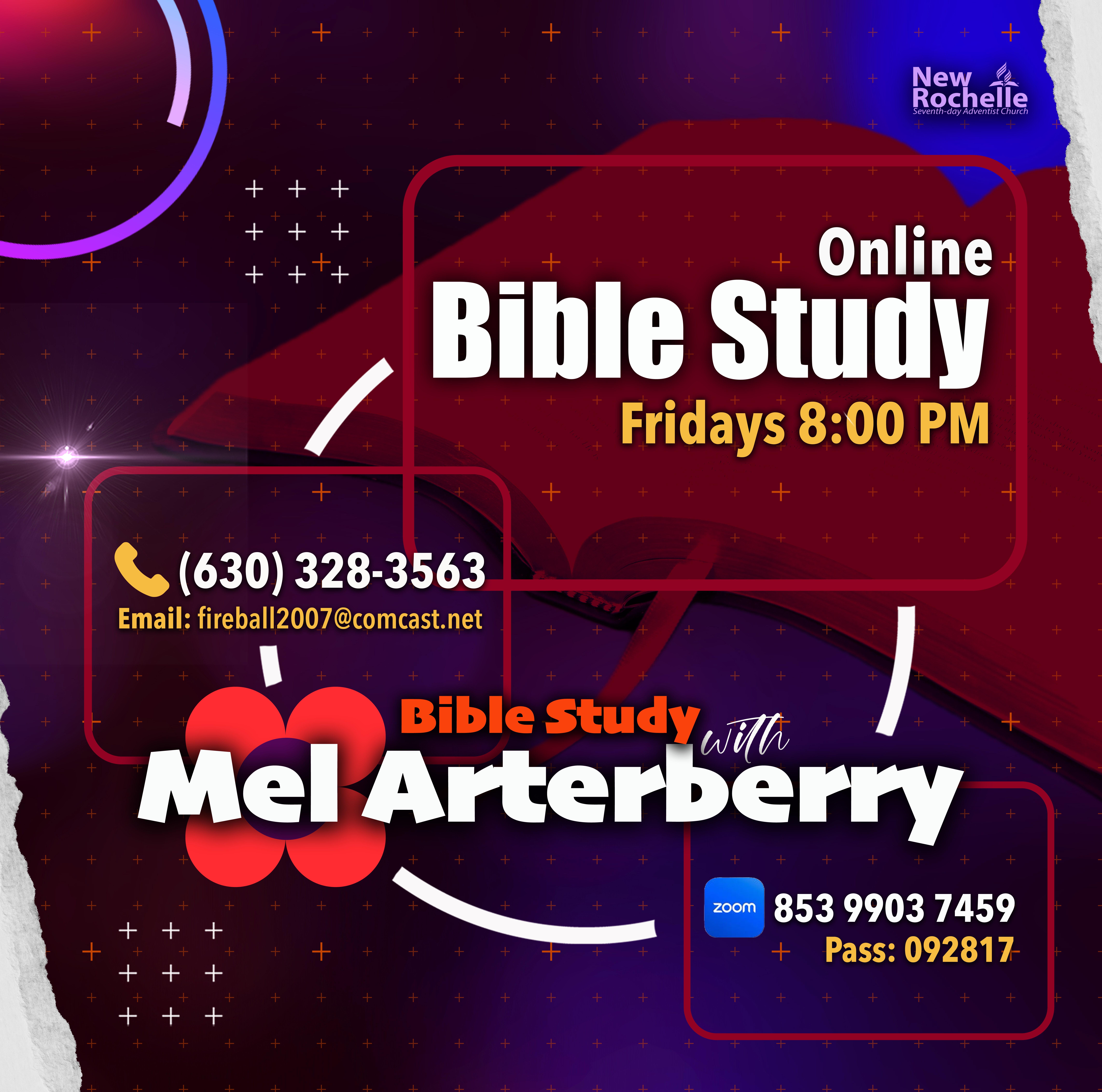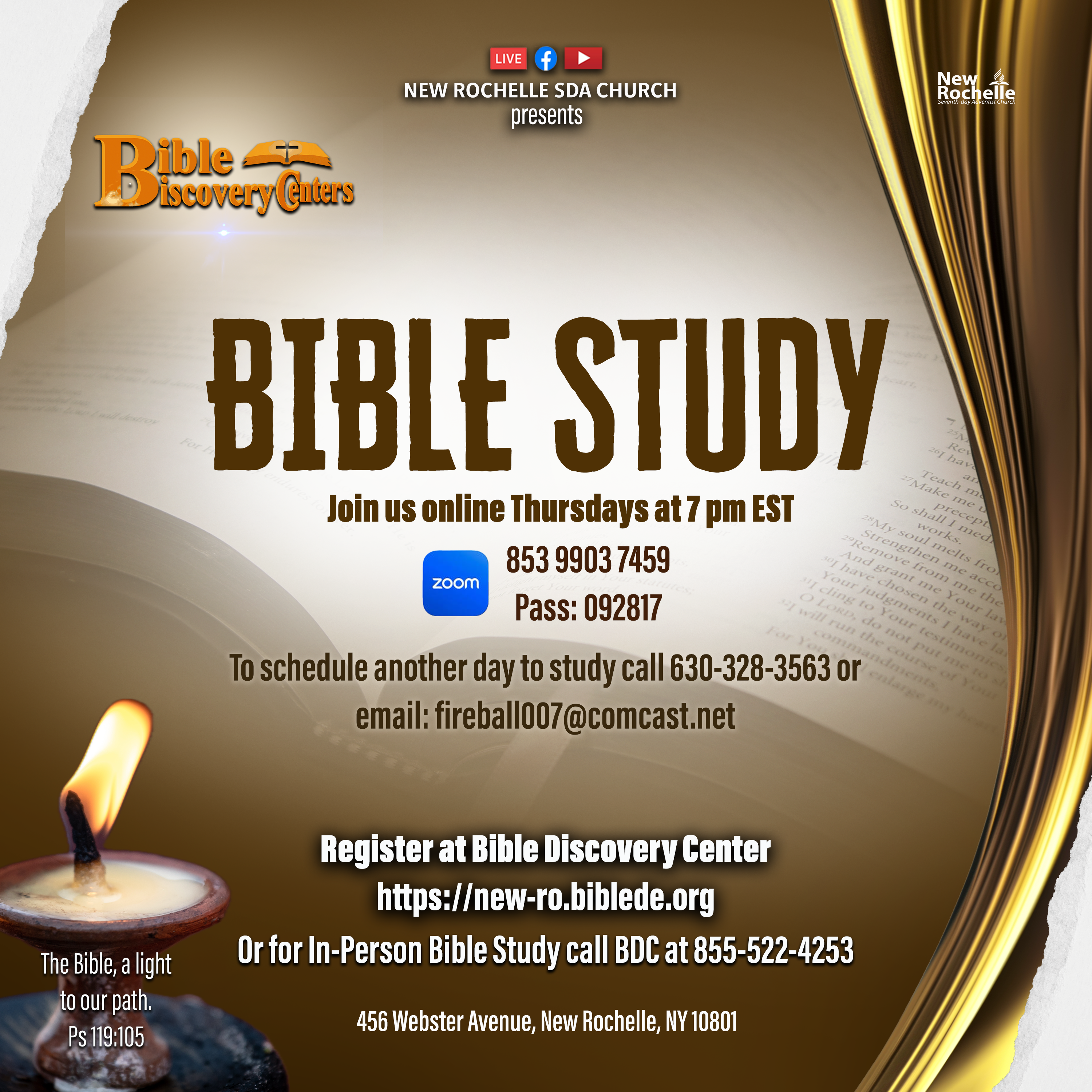OUR FUNDAMENTAL BELIEFS

- In a personal God. Hebrews 1:1-3.
- In Jesus Christ, as the divine Son of God and as our Savior. John 1:1-3, 14; Hebrews 7:25.
- In the Holy Spirit, the divine Comforter. John 15.26.
- In regeneration and the new birth, through the acceptance of the gospel. John 3:1-7; 2 Corinthians 5:17.
- That the Bible is the inspired Word of God. 2 Timothy 3:16, 17.
- That the second coming of Christ is very near. That it will be literal, personal, and visible to all. John 14:1-3;Acts 1:11; Matthew 24:30.
- That man by nature is mortal. Job 4:17; 1 Timothy 6:15, 16.
- That immortality and eternal life are the gift of God and are received only through Christ. Romans 6:23.
- That the dead are in an unconscious state. Ecclesiastes 9:5; John 11:11,14.
- That there will be a resurrection of the dead. 1 Thessalonians 4:16, 17.
- That the wicked will not burn eternally, but be burned up. Malachi 4:1-3.
- That righteousness comes by faith, not by works. Romans 4:3-5; Ephesians 2:8,9.
- That salvation comes as gift of God and is not received through any merit of the sinner’s. Ephesians 2:8.
- That the law of ten commandments is the standard of righteousness by which all will be judged and which all Christians are commanded to obey. James 2:10-12; Exodus 20:3-17.
- That the original seventh day Sabbath has never been changed by divine authority and therefore all Christians are under obligation to keep it holy. Genesis 2:2, 3; Luke 23:54,56.
- In the support of the gospel through tithes and offerings. Leviticus 27:30, 32; Malachi 3:8-11, Matthew 23:23.
- In baptism by immersion. Mark 1:9,10; Romans 6:3-5.
- In the ordinances of humility and the Lord’s Supper. John 13:4-17; 1 Corinthians 11:23-26.
- In the gifts of the Spirit, including the Spirit of prophecy. Ephesians 4:8-11; Revelation 12:17; Revelation 19:10.
- In discarding unhealthful practices, such as the use of intoxicants, tobacco, unclean meats, etc. Proverbs 23-29-32; 1 Corinthians 3:16, 17; Deuteronomy 14, 3-20; Isaiah 66:16-17.
Copyright © 2015, General Conference of Seventh-day Adventists
www.adventist.org
The Holy Scriptures, Old and New Testaments, are the written Word of God, given by divine inspiration. The inspired authors spoke and wrote as they were moved by the Holy Spirit. In this Word, God has committed to humanity the knowledge necessary for salvation. The Holy Scriptures are the supreme, authoritative, and the infallible revelation of His will. They are the standard of character, the test of experience, the definitive revealer of doctrines, and the trustworthy record of God’s acts in history. (Ps. 119:105; Prov. 30:5, 6; Isa. 8:20; John 17:17; 1 Thess. 2:13; 2 Tim. 3:16, 17; Heb. 4:12; 2 Peter 1:20, 21.)
The gracious Creator, after the six days of Creation, rested on the seventh day and instituted the Sabbath for all people as a memorial of Creation. The fourth commandment of God’s unchangeable law requires the observance of this seventh-day Sabbath as the day of rest, worship, and ministry in harmony with the teaching and practice of Jesus, the Lord of the Sabbath. The Sabbath is a day of delightful communion with God and one another. It is a symbol of our redemption in Christ, a sign of our sanctification, a token of our allegiance, and a foretaste of our eternal future in God’s kingdom. The Sabbath is God’s perpetual sign of His eternal covenant between Him and His people. Joyful observance of this holy time from evening to evening, sunset to sunset, is a celebration of God’s creative and redemptive acts. (Gen. 2:1-3; Exod. 20:8-11; 31:13-17; Lev. 23:32; Deut. 5:12-15; Isa. 56:5, 6; 58:13, 14; Ezek. 20:12, 20; Matt. 12:1-12; Mark 1:32; Luke 4:16; Heb. 4:1-11.)
There is one God: Father, Son, and Holy Spirit, a unity of three coeternal Persons. God is immortal, all-powerful, all-knowing, above all, and ever present. He is infinite and beyond human comprehension, yet known through His self-revelation. God, who is love, is forever worthy of worship, adoration, and service by the whole creation. (Gen. 1:26; Deut. 6:4; Isa. 6:8; Matt. 28:19; John 3:16 2 Cor. 1:21, 22; 13:14; Eph. 4:4-6; 1 Peter 1:2.)
By baptism we confess our faith in the death and resurrection of Jesus Christ, and testify of our death to sin and of our purpose to walk in newness of life. Thus we acknowledge Christ as Lord and Saviour, become His people, and are received as members by His church. Baptism is a symbol of our union with Christ, the forgiveness of our sins, and our reception of the Holy Spirit. It is by immersion in water and is contingent on an affirmation of faith in Jesus and evidence of repentance of sin. It follows instruction in the Holy Scriptures and acceptance of their teachings. (Matt. 28:19, 20; Acts 2:38; 16:30-33; 22:16; Rom. 6:1-6; Gal. 3:27; Col. 2:12, 13.)
God the eternal Spirit was active with the Father and the Son in Creation, incarnation, and redemption. He is as much a person as are the Father and the Son. He inspired the writers of Scripture. He filled Christ’s life with power. He draws and convicts human beings; and those who respond He renews and transforms into the image of God. Sent by the Father and the Son to be always with His children, He extends spiritual gifts to the church, empowers it to bear witness to Christ, and in harmony with the Scriptures leads it into all truth. (Gen. 1:1, 2; 2 Sam. 23:2; Ps. 51:11; Isa. 61:1; Luke 1:35; 4:18; John 14:16-18, 26; 15:26; 16:7-13; Acts 1:8; 5:3; 10:38; Rom. 5:5; 1 Cor. 12:7-11; 2 Cor. 3:18; 2 Peter 1:21.)
The church is the community of believers who confess Jesus Christ as Lord and Saviour. In continuity with the people of God in Old Testament times, we are called out from the world; and we join together for worship, for fellowship, for instruction in the Word, for the celebration of the Lord’s Supper, for service to humanity, and for the worldwide proclamation of the gospel. The church derives its authority from Christ, who is the incarnate Word revealed in the Scriptures. The church is God’s family; adopted by Him as children, its members live on the basis of the new covenant. The church is the body of Christ, a community of faith of which Christ Himself is the Head. The church is the bride for whom Christ died that He might sanctify and cleanse her. At His return in triumph, He will present her to Himself a glorious church, the faithful of all the ages, the purchase of His blood, not having spot or wrinkle, but holy and without blemish. (Gen. 12:1-3; Exod. 19:3-7; Matt. 16:13-20; 18:18; 28:19, 20; Acts 2:38-42; 7:38; 1 Cor. 1:2; Eph. 1:22, 23; 2:19-22; 3:8-11; 5:23-27; Col. 1:17, 18; 1 Peter 2:9.)
The second coming of Christ is the blessed hope of the church, the grand climax of the gospel. The Saviour’s coming will be literal, personal, visible, and worldwide. When He returns, the righteous dead will be resurrected, and together with the righteous living will be glorified and taken to heaven, but the unrighteous will die. The almost complete fulfillment of most lines of prophecy, together with the present condition of the world, indicates that Christ’s coming is near. The time of that event has not been revealed, and we are therefore exhorted to be ready at all times. (Matt. 24; Mark 13; Luke 21; John 14:1-3; Acts 1:9-11; 1 Cor. 15:51-54; 1 Thess. 4:13-18; 5:1-6; 2 Thess. 1:7-10; 2:8; 2 Tim. 3:1-5; Titus 2:13; Heb. 9:28; Rev. 1:7; 14:14-20; 19:11-21.)




